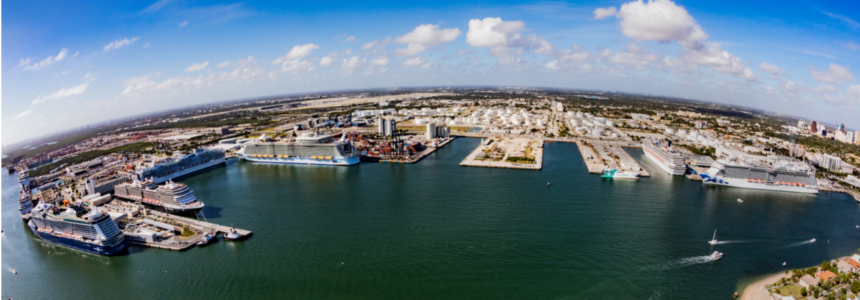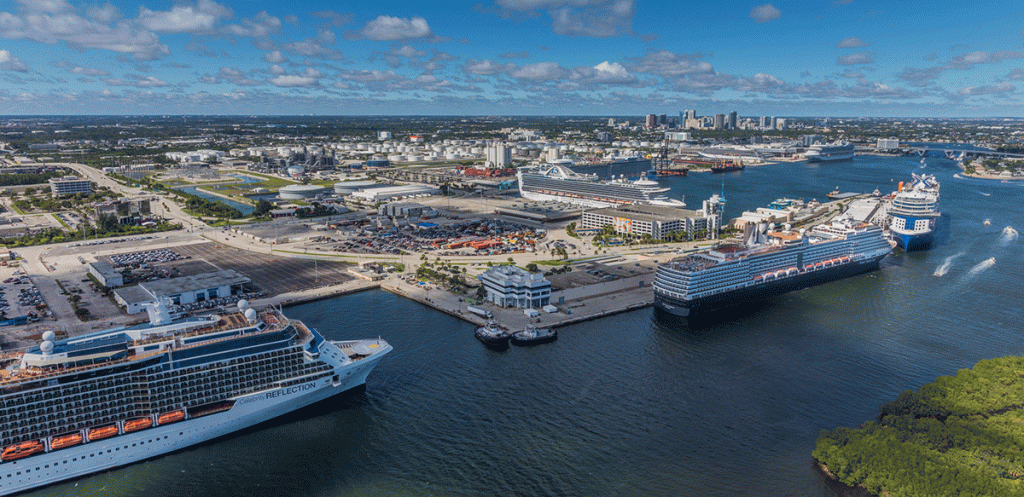News & Updates
Port Everglades: A Global Leader for Cruise, Cargo and Energy

Business diversity and a strong commitment to customer service distinguishes Port Everglades from most U.S. seaports. With its proximity to the popular Caribbean, Port Everglades is the third busiest cruise homeport in the world. It is a leading container port in Florida and among the most active cargo ports in the United States. Port Everglades is also South Florida’s main seaport for receiving energy products, including gasoline and jet fuel. Port customers benefit from state-of-the-art foreign-trade zone warehousing and a 43-acre international and domestic intermodal container transfer facility that makes it possible for cargo shipped to Port Everglades to reach Atlanta and Charlotte within two days, and 70 percent of the U.S. population in four days.
“It can be a bit of a balancing act, but Port Everglades operates like a well-oiled machine due to our dedicated workforce and a commitment to making our port a diversified global leader for cruise, cargo and energy,” said Jonathan Daniels, Port Everglades Chief Executive and Port Director. “Our mission is to be No. 1 in everything we do, and we recognize that true partnerships with our customers will get us there.”
A key to Port Everglades’ success is its favorable location in the heart of South Florida with direct highway access and an international airport at its doorstep.

Port Everglades hosts nearly 4 million passengers annually sailing Caribbean, South American and Transatlantic itineraries offered by a variety of cruise lines and one daily ferry service.
An epicenter for international trade, the Port is positioned in one of the world’s largest consumer regions with a constant flow of seasonal visitors, including a combined 110 million residents and seasonal visitors within a 500-mile radius. In fact, Port Everglades is the U.S. gateway for trade with Latin America, moving 13 percent of all U.S./Latin American trade.
The Port’s diversified cargo mix includes containers, refrigerated cargo (4th for imports in the United States), new and used automobiles and trucks, dry bulk, breakbulk, project, RO/RO and liquid bulk.
The Port Everglades International Logistics Center, developed in 2020 through a public-private partnership with Center Point Port Everglades LLC, replaces an outdated foreign-trade zone facility with efficient, contemporary warehousing within two buildings on 16.657 acres of Port property. The ILC contains warehouse, refrigerated warehouse and office space, and cross-docking facilities to support services available to shippers using Port Everglades. The entire logistics center is designated as a Foreign-Trade Zone.
Approximately 38 percent of the petroleum consumed in Florida is stored and distributed by companies located within Port Everglades, including jet fuel for four international airports.
In a typical, non-COVID year, Port Everglades hosts nearly 4 million passengers annually sailing Caribbean, South American and Transatlantic itineraries offered by a variety of cruise lines and one daily ferry service. Guests enjoy the Port’s proximity to three international airports including the rapidly growing Fort Lauderdale-Hollywood International Airport (FLL) less than two miles away. For pre- and post-cruise stays, Port Everglades is a short drive to sweeping beachfronts, a vibrant art scene, world-class restaurants, craft breweries, entertainment, shopping, casinos, and family-friendly activities — including our namesake, the Florida Everglades.
Port Everglades recently opened its new Heron Parking Garage to serve Cruise Terminals 2 and 4. Guests going to Terminal 2, Princess Cruises’ prototype Ocean Medallion terminal, travel along an elevated, air-conditioned pedestrian bridge with moving walkways. The state-of the-art 1,818-space garage also features solar energy, nine elevators, touchless smart parking entry and payment, a dedicated level for drop off and pick up, and a 70-foot-tall optical illusion mural of a Florida Great White Heron. New wayfinding signs, also spotlighting Florida’s wildlife and fauna, are being installed in the garage and throughout the Port’s roadways.
Always striving to modernize its facilities to maximize productivity, Port Everglades follows an aggressive, comprehensive Master/Vision Plan that is updated every 2-4 years to reanalyze and update market trends, changes in the cruise, cargo shipping and energy industries, local planning initiatives and evolving technology. This in-depth analysis provides a projective and substantiated market-driven and environmentally sound phased roadmap for guiding cost-feasible capital investments over the next 20 years.
Capital Improvements Underway
Construction is 75 percent completed for the largest infrastructure project in the Port’s history. The Southport Turning Notch Extension, slated for completion in late 2022, will add new cargo berths and Super Post-Panamax gantry cranes to the Port’s main containerized cargo area by lengthening the existing turnaround area (turning notch) from 900 feet to 2,400 feet. Part of the $471 million project includes installing crane rail infrastructure to handle new Super Post-Panamax gantry cranes and upgrade existing cranes to improve productivity. The entire project is estimated to create 3,045 construction jobs and support 5,529 direct and indirect local/regional jobs.
Port Everglades recently commissioned three Super Post-Panamax container-handling gantry cranes at $13.8 million each to meet demands from current customers and new services anticipated from the Port’s multi-million-dollar expansion program. Three additional Super Post-Panamax gantry cranes are anticipated to arrive in 2024. The new cranes can load and unload ships with containers stacked nine high from the deck and reach 22 containers across to the ships outer rail.
To further enhance ship traffic at Port Everglades, the U.S. Army Corps of Engineers (USACE) is advancing a 24-year plan to deepen the Port’s navigation channels from 42 feet to 48-50 feet and widen narrower sections of the channel for safe vessel passage. The USACE estimates the project will create a total of 2,222 direct and 2,567 indirect construction jobs. Construction is anticipated to be completed by 2030.
In December 2016, the Port received federal authorization that allowed the U.S. Army Corps of Engineers to move forward with the preconstruction engineering and design (PED) phase of deepening and widening the Port’s navigation channels. In February 2020, the project was included as new construction start in the USACE FY2020 Work Plan and awarded $29 million for the first phase of the project, the U.S. Coast Guard Station Fort Lauderdale reconfiguration.
In the Port’s energy sector, a $184-million Slip 1 expansion will allow the Port to safely service the petroleum industry with greater capacity, efficiency, sustainability and resiliency. This is a public-private partnership, with the civil infrastructure being constructed by the Port and mechanical components being installed by private partners. Private industry has already begun its investment by relocating upsizing piping and constructing a new central manifold, updating valve systems, and elevating piping. The multi-product, multi-receiver manifold will facilitate product sharing, optimizing off-loading. Port Everglades will reconstruct the slip, making it 150-feet wider to accommodate larger ships. The project is anticipated to be completed by 2025.
The Port Everglades Department is a self-supporting Enterprise Fund of Broward County government. It does not rely on local tax dollars for operations or capital improvements. As of fiscal year 2020, ending September 30, 2020, the latest study completed, the total value of economic activity at Port Everglades is nearly $30 billion. Approximately 196,000 Florida jobs are impacted by the Port, including more than 10,000 people who work for companies that provide direct services to Port Everglades.
